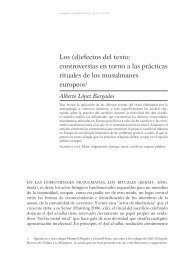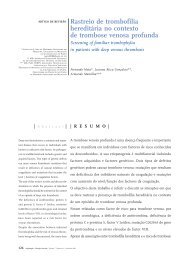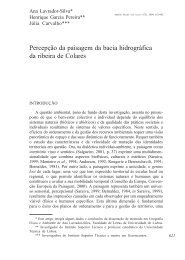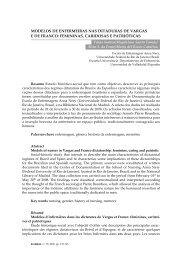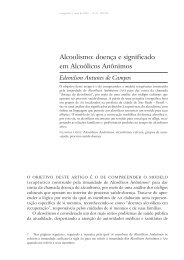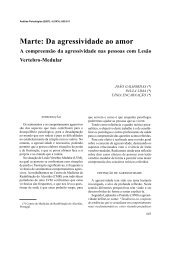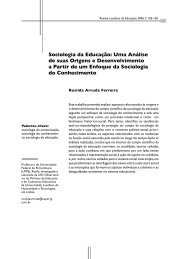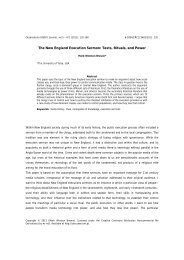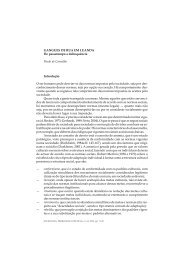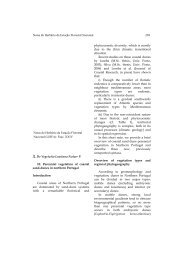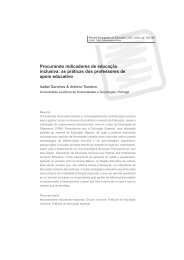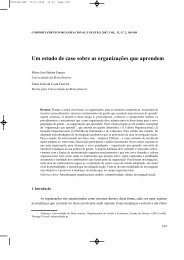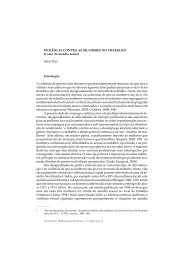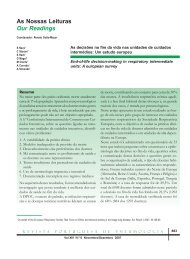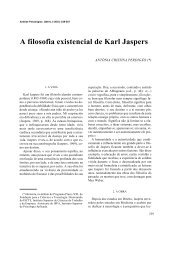O fim da Guerra Fria e a unificação alemã - SciELO
O fim da Guerra Fria e a unificação alemã - SciELO
O fim da Guerra Fria e a unificação alemã - SciELO
Create successful ePaper yourself
Turn your PDF publications into a flip-book with our unique Google optimized e-Paper software.
matic Path to German Unity. Baden-Baden:<br />
Nomos, 1996, p. 224.<br />
25 Kohl, citado em ElbE, Frank, e KiEsslEr,<br />
Richard – A Round Table with Sharp Corners:<br />
The Diplomatic Path to German Unity,<br />
p. 224.<br />
26 No seu plano de dez pontos Kohl não<br />
fez referência à fronteira existente entre a<br />
r<strong>da</strong> e a Polónia. O chanceler argumentava<br />
que só a Alemanha unifica<strong>da</strong> poderia assinar<br />
um tratado com a Polónia sobre a fronteira<br />
conjunta. Num discurso perante o Bundestag,<br />
em 8 de Março de 1990, afirmou que a<br />
questão fronteiriça ficaria resolvi<strong>da</strong> num<br />
tratado bilateral entre o Governo polaco e o<br />
Governo <strong>da</strong> Alemanha unifica<strong>da</strong>, o que viria<br />
a acontecer no tratado assinado em 14 de<br />
Novembro de 1990.<br />
27 HutcHings, Robert L. – «The US, German<br />
unification and European integration».<br />
In bozo, F. et al. – Europe and the End of the<br />
Cold War: A Reappraisal. Routledge, 2008.<br />
28 adomEit, Hannes – «Gorbachev’s consent<br />
to united Germany’s membership in<br />
nato’. In BOZO, Frédéric et al. – Europe and<br />
the End of the Cold War: A Reappraisal; adomEit,<br />
Hannes – «Gorbachev’s consent to<br />
unified Germany’s membership in NATO». In<br />
SWP Working Paper, FG 5 2006/11, Novembro<br />
de 2006.<br />
29 zEliKow, Philip, e ricE, Condoleezza –<br />
Germany Unified and Europe Transformed: A<br />
Study in Statecraft. Cambridge, Mas: Harvard<br />
University Press, 1995, pp. 232-233. Zelikow<br />
e Rice 1996: 232-233.<br />
30 ElbE, Frank, e KiEsslEr, Richard – A<br />
Round Table with Sharp Corners: The Diplomatic<br />
Path to German Unity, p. 80.<br />
31 Ididem, p. 76.<br />
32 Sobre a dissolução <strong>da</strong> r<strong>da</strong>, cf. maiEr,<br />
Charles – Dissolution: The Crisis of Communism<br />
and the End of East Germany. Princeton,<br />
NJ: Princeton University Press, 1997.<br />
33 gEnscHEr, Hans-Dietrich – Erinnerungen.<br />
Berlim: Siedler, 1995.<br />
34 Discurso de Hans-Dietrich Genscher<br />
sobre «A uni<strong>da</strong>de <strong>alemã</strong> no contexto europeu».<br />
35 ElbE, Frank, e KiEsslEr, Richard – A<br />
Round Table with Sharp Corners: The Diplomatic<br />
Path to German Unity, p 79.<br />
36 Ibidem.<br />
37 Ibidem, p. 83.<br />
38 Ibidem, p. 80.<br />
39 Ibidem, p. 82.<br />
40 Archie Brown cedo argumentou que o<br />
papel de Gorbachev foi decisivo no <strong>fim</strong> <strong>da</strong><br />
<strong>Guerra</strong> <strong>Fria</strong>. brown, Archie – The Gorbachev<br />
Factor. Oxford: Oxford University Press, 1996;<br />
brown, Archie – «Perestroika and the end<br />
of the Cold War». In Cold War History. Vol. 7,<br />
N.º 1, 2007, pp. 1-17.<br />
41 A doutrina Brejnev foi a doutrina <strong>da</strong><br />
soberania limita<strong>da</strong> que a urss adoptou na<br />
déca<strong>da</strong> de 1960 e que legitimou a intervenção<br />
militar do Pacto de Varsóvia na Checoslováquia<br />
em 1968, pondo termo ao<br />
movimento reformista checoslovaco no período<br />
conhecido como a «Primavera de<br />
Praga».<br />
42<br />
KoHl, Helmut – Ich wollte Deutschlands<br />
Einheit, p. 272.<br />
43 Embora Gorbachev gozasse de apoio<br />
público considerável no mundo ocidental<br />
pela sua agen<strong>da</strong> reformista na política<br />
externa, a sua base de apoio interna era<br />
frágil. Contudo, após meses de críticas<br />
internas Gorbachev conseguiu consoli<strong>da</strong>r a<br />
sua posição no 28.º congresso do pcus, em<br />
inícios de Julho de 1990, permitindo-lhe,<br />
pouco depois, conceder publicamente o seu<br />
aval à <strong>unificação</strong> <strong>alemã</strong>, no encontro entre<br />
Gorbachev, Shevardnadze, Kohl e Genscher<br />
no Cáucaso.<br />
44 baKEr, James A. – The Politics of Diplomacy:<br />
Revolution, War and Peace, 1989-1992.<br />
Nova York: Putnam, 1995.<br />
45 O que aconteceu em Dezembro de 1990,<br />
em Paris, conferência que transformou a<br />
cscE em oscE.<br />
46 zEliKow, Philip, e ricE, Condoleezza –<br />
Germany Unified and Europe Transformed: A<br />
Study in Statecraft, pp. 300-301.<br />
47 Para uma descrição detalha<strong>da</strong> ver<br />
zEliKow, Philip, e ricE, Condoleezza – Germany<br />
Unified and Europe Transformed: A Study<br />
in Statecraft, pp. 303-327. zEliKow e ricE<br />
1996: 303-327.<br />
48 Cf. KustErs, Hanns Jurgen – «The Kohl-<br />
Gorbachev meetings in Moscow and in the<br />
Caucasus, 1990». In Cold War History. Vol. 2,<br />
N.º 2, 2002.<br />
49 Treaty on the Final Settlement with respect<br />
to Germany, 12 de Setembro de 1990.<br />
Disponível em: http://usa.usembassy.de/<br />
etexts/2plusfour8994e.htm. A <strong>unificação</strong><br />
<strong>alemã</strong> ocorreu de acordo com o artigo 23.º<br />
<strong>da</strong> Lei Fun<strong>da</strong>mental e não segundo o artigo<br />
146.º. Em discussão estava a mo<strong>da</strong>li<strong>da</strong>de<br />
de como a <strong>unificação</strong> deveria ocorrer:<br />
segundo o artigo 23.º, a República Democrática<br />
Alemã juntar-se-ia à rfa, sem alteração<br />
<strong>da</strong> Lei Fun<strong>da</strong>mental existente e<br />
através <strong>da</strong> adopção dos compromissos institucionais<br />
como os Acordos de Paris de<br />
1954 e a permanência na nato. Em contraparti<strong>da</strong>,<br />
segundo o artigo 146.º, a <strong>unificação</strong><br />
teria ocorrido através <strong>da</strong> criação de<br />
uma nova enti<strong>da</strong>de estatal e de uma nova<br />
constituição.<br />
50 Treaty on the Final Settlement with respect<br />
to Germany, 12 de Setembro de 1990.<br />
51 The Unification of Germany in 1990. Bona:<br />
Press and Information Office of the Federal<br />
Government, 1991, p. 131.<br />
52 bulmEr, S. C. Jeffery, e patErson, W.<br />
– Germany’s European Diplomacy: Shaping the<br />
Regional Milieu. Manchester: Manchester<br />
University Press, 2000.<br />
53 KoHl, Helmut – Discurso Proferido no Dia<br />
<strong>da</strong> Unificação, a 3 de Outubro de 1997 em<br />
Estugar<strong>da</strong>.<br />
54 rüHE, Volker – «Europe and the Alliance:<br />
key factors for peace and stability». In NATO<br />
Review. Vol. 41, N.º 3, 1993, pp. 12-15; rüHE,<br />
Volker – «Shaping Euro-Atlantic policies: a<br />
grand strategy for a new era». In Survival.<br />
Vol. 35, N.º 2, 1993, pp. 129-137. Cf. também<br />
«Ewiger Frieden», Der Spiegel. N.º 40, 3 de<br />
Outubro de 1994, pp. 36-37. O argumento<br />
segundo o qual a Alemanha desempenhou<br />
um papel crucial, juntamente com os Estados<br />
Unidos, no alargamento <strong>da</strong> nato logo<br />
no início <strong>da</strong> déca<strong>da</strong> de 1990 foi feito por<br />
tEwEs, Henning – Germany, Civilian Power,<br />
and the New Europe: Enlarging NATO and the<br />
European Union. Nova York: Palgrave, 2002;<br />
e arora, Chaya – Germany’s Civilian Power<br />
Diplomacy. Nova York: Palgrave Macmillan,<br />
2006.<br />
55 Nos últimos anos surgiu uma controvérsia<br />
sobre a posição dos países ocidentais<br />
durante as negociações para a <strong>unificação</strong><br />
<strong>alemã</strong> acerca do eventual alargamento <strong>da</strong><br />
nato para o Leste europeu. A Rússia tem<br />
repeti<strong>da</strong>mente afirmado que durante 1990<br />
teriam sido <strong>da</strong><strong>da</strong>s garantias aos líderes<br />
soviéticos de que a nato não se alargaria<br />
para o Leste europeu, respeitando assim os<br />
objectivos soviéticos. Os Estados Unidos, a<br />
Grã-Bretanha, a França e a Alemanha<br />
negam que tal questão tivesse sequer estado<br />
na mesa de negociações e afirmam que o<br />
que se negociou foi meramente o estatuto<br />
<strong>da</strong> Alemanha unifica<strong>da</strong> no seio <strong>da</strong> nato,<br />
tendo ficado estipulado pelo Tratado de 12<br />
de Setembro de 1990 que ao território <strong>da</strong><br />
antiga r<strong>da</strong> seria atribuído um «estatuto<br />
militar especial» onde não seriam coloca<strong>da</strong>s<br />
forças <strong>da</strong> nato enquanto as tropas soviéticas<br />
não tivessem retirado. Cf. KramEr, Mark –<br />
«The myth of a no-nato enlargement pledge<br />
to Russia». In The Washington Quarterly.<br />
Vol. 32, N.º 2, Abril de 2009, pp. 39-61; e<br />
mastny, Vojtech – «Eastern Europe and the<br />
early prospects for Ec/Eu and nato membership».<br />
In Cold War History. Vol. 9, N.º 2,<br />
Maio de 2009, pp. 203-221.<br />
56 Citado por günscHE, Karl-Ludwig – «Wie<br />
sich Russland die Nato-Osterweiterung<br />
vorstellt». In Die Welt, 1 de Abril de 1997.<br />
57 KaisEr, Karl – Deutschlands aussenpolitische<br />
Verantwortung in einer interdependenten<br />
Welt. Estugar<strong>da</strong>: Robert Bosch<br />
Stiftung, 2000, p. 28.<br />
58 HutcHings, Robert – Brussels Forum,<br />
Maio de 2009. Disponível em: http://www.<br />
gmfus.org/brusselsforum/2009/publications<br />
2009.html<br />
59 <strong>da</strong>EHnHardt, Patrícia – «De Kohl a<br />
Merkel: a gradual afirmação <strong>da</strong> Alemanha<br />
como grande potência euro-atlântica». In<br />
Relações Internacionais. Lisboa: ipri – unl,<br />
N.º 14, 2007.<br />
O <strong>fim</strong> <strong>da</strong> <strong>Guerra</strong> <strong>Fria</strong> e a <strong>unificação</strong> <strong>alemã</strong> Patrícia Daehnhardt 051



